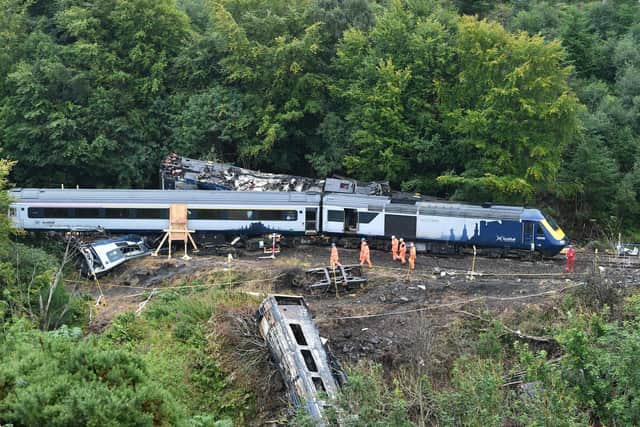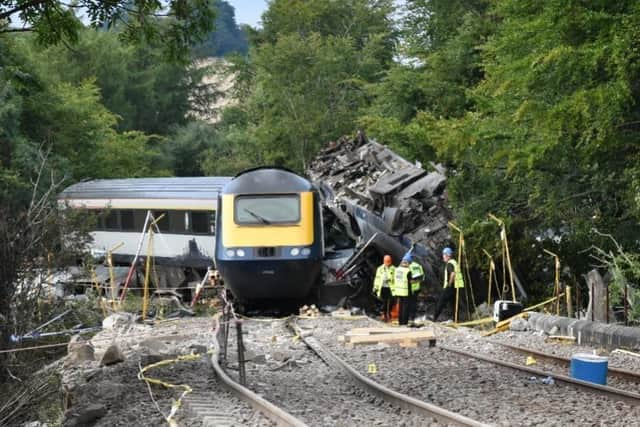Drivers’ union Aslef to discuss lifting threat to boycott train fleet in fatal Carmont crash
Train drivers are expected to decide within days whether to lift their threat to boycott the ageing ScotRail fleet involved in the fatal Carmont crash whose third anniversary is on Saturday, The Scotsman has learned.
Drivers’ union Aslef had said its members would stop driving the 40-year-old trains if they were not withdrawn by the anniversary, which would cause significant disruption to services across Scotland.
Advertisement
Hide AdAdvertisement
Hide AdThe union is seeking extra safety measures to protect drivers and passengers, while an industry source said it was also lobbying for the trains to be replaced earlier than their scheduled 2030 removal date.


Aslef’s national executive is due to meet next Wednesday to discuss whether its members should continue to drive the trains. It told The Scotsman the meeting had been postponed from last month as it was “making progress on improvements”.
Scottish Labour and the TSSA union, which represents ScotRail office staff, have also called for the trains to be scrapped. They have already been withdrawn by other train operators in Scotland including LNER.
In the crash south of Stonehaven in Aberdeenshire on August 12 2020, the train’s driver Brett McCullough, conductor Donald Dinnie and a passenger, Christopher Stuchbury, were killed after it hit debris washed from a wrongly-built drain onto the track after intense rainfall.
The official report by the UK Department for Transport’s Rail Accident Investigation Branch (RAIB), published nearly 18 months ago, made 20 safety recommendations including safety improvements to the “High Speed Train” (HST) fleet involved. ScotRail operates them as Inter7City services between Edinburgh/Glasgow and Aberdeen/Inverness.


The RAIB said it did not regard the trains as “unsafe”, but it was “more likely than not that the outcome would have been better if the train had been compliant with modern crashworthiness standards”. RAIB chief inspector of rail accidents Simon French called for consideration of “the longer-term implications of continuing to operate rolling stock that pre-dates modern standards”.
The 300-page RAIB report also made recommendations over how the rail industry handled extreme weather and inspected infrastructure. Most of the recommendations were addressed to Network Rail, which is responsible for the network. It is due to be prosecuted over health and safety shortcomings but it is believed no corporate homicide charges will be brought.
The UK Government body has implemented two of the recommendations in full so far, according to the RAIB. An industry group is considering recommendations relating to the train.
Advertisement
Hide AdAdvertisement
Hide AdScotRail is already implementing one of these by fitting heavy metal brackets, known as lifeguards, in front of the front wheels of the trains to prevent small obstacles from getting under them and causing them to come off the tracks.
The Carmont Rolling Stock Recommendations Steering Group is considering the RAIB’s other recommendations, including the removal of the sharp edges of tables when folded down to reduce the risk of injuries to passengers. It is also assessing the risk posed by the trains lacking “certain modern crashworthiness features” introduced nearly 30 years ago.
One ScotRail driver has described themselves as "angry, terrified, powerless" while operating the trains, particularly because of the lack of protection offered by the fibreglass cab. Their concerns are shared by rail engineer Gareth Dennis, who has criticised the trains’ “zero crashworthiness”.
He said: “These trains were the wrong choice in the first place, given that refurbished HSTs were incompatible with future electrification and they had only around a 15-year lifespan.
"Meanwhile, procuring modern trains such as Greater Anglia's Stadler fleet, which provides level boarding and operation both under and away from overhead wires, would have cost only 30 per cent extra whilst providing 150 per cent more lifespan.
In 2015 prices, the cost of the refurbished train fleet was £475 million, whilst the cost of a fleet of Stadler trains would be around £600m, slightly over £100m more for at least 25 years of extra service.
“In the context of the tragic derailment at Carmont, the RAIB report concluded that, whilst the HST did not cause the crash, it did in all likelihood result in it being fatal. To this end, given their lack of crashworthiness for passengers but particularly for the driver, a plan needs to be set out as to the precise timeline of their replacement.
"Rail remains the safest way to travel across land, but where industry and politicians can make decisions that further improve that safety, then they should do so. Thankfully, Scotland's Railway [ScotRail and Network Rail Scotland] is currently finalising plans for their replacement, for which I expect further details will be published soon.”
Advertisement
Hide AdAdvertisement
Hide AdAslef has said failures highlighted in the RAIB report amounted to a “watershed moment for rail safety” and decried “endemic and tragic corporate failure”.
However, on the boycott threat, its Scotland district organiser Kevin Lindsay said: “We’ve nothing to say whilst the talks are ongoing.” He said there would be nothing formal to mark the anniversary, at the request of the families.
A ScotRail spokesperson said: “Ahead of the third anniversary, Aslef had set out its intention to instruct its members to withdraw from driving our HSTs. We are working closely with Aslef to find a solution to this issue. In the meantime, our HSTs will continue in service as normal.”
On the RAIB recommendations, it said: “We are continuing to work with all interested parties, and wouldn't want to pre-empt the ongoing steering group work."
Scottish Conservatives transport spokesperson Graham Simpson said: “On the third anniversary of the Carmont rail crash we should first and foremost remember the three victims. The fleet should be replaced and all the recommendations in the report implemented.”
Scottish Labour Transport spokesperson Alex Rowley said “My thoughts are first and foremost with all those who lost a loved one in this tragic accident.
“Lessons should have been learned from this devastating crash and every possible action should have been taken to improve safety on our railways – but sadly that has not been the case.
“ScotRail is still using trains that fall short of modern safety standards despite the damning evidence that these trains were a factor in the severity of the crash.
Advertisement
Hide AdAdvertisement
Hide Ad“It is utterly shameful that the SNP government has continued to ignore warnings about these out-of-date trains when lives could be at stake.
“It is essential that our trains meet modern safety standards, and the SNP must waste no more time replacing the fleet in question.”
TSSA Interim Joint General Secretary Peter Pendle said, “It’s unacceptable that the High Speed Trains are still running on Scotland’s railways, three years after the Carmont tragedy.
“The RAIB report could not have been clearer, the High Speed Train was not compliant with modern crashworthiness standards. If it had been, the outcome might have been better and three people might still have been alive today. We are fully engaged with the ScotRail steering group looking at the safety of HSTs, we’re raising our concerns there, but the simple truth is that these trains need to be replaced.
“The Carmont derailment happened at the height of the pandemic, and very few people were on the train. I hate to think what could happen today, if another HST was involved in an accident.
“ScotRail is in public ownership now and that has to count for something. Humza Yousaf has been a Transport Secretary. He knows how important rail safety is. The Scottish government should act now to replace the HSTs with a fleet that meet modern crashworthiness standards. Scottish passengers deserve nothing less.”
Comments
Want to join the conversation? Please or to comment on this article.